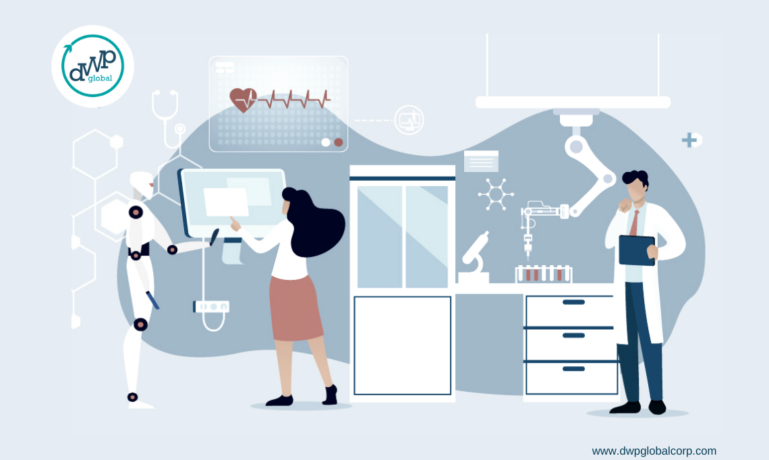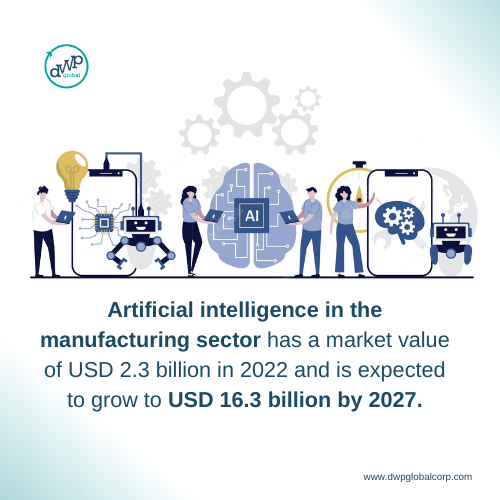- By: Admin
- April 7, 2023
- 2314 views

Robotic Process Automation (RPA) is a revolutionary technology that uses software robots or artificial intelligence workers to execute time-consuming and repetitive tasks accurately and quickly. The process works by watching the user perform the task in Graphical User Interface and repeating it in the same application. The robot executes the tasks using a virtual environment by interpreting the screen display electronically.
The advent of the two cutting-edge technologies, namely RPA and artificial intelligence (AI), led to the rise of a new era in several fields, including but not limited to banking and finance process automation, mortgage and lending processes, customer care automation, the data extraction process, social media marketing, eCommerce merchandising operations, optical character recognition applications, and fixed automation process.
Manufacturers can use the new technologies by partnering with the right software automation implementation partners for their business.
The Evolution Of Robotic Process Automation
In the 1990s, RPA began with the automation of user interface testing. It was when companies needed various UI testing scripts for their digital transformation to stay on par with their peers. The emergence of Windows 95 at the time caused the expansion of computer usage from large corporations to user homes, leading to the start of UI testing development.
The 2000s witnessed the automation of data extraction from an application, which greatly improved the efficiency of business processes. Financial institutions welcomed the idea and implemented automation to save time and make it more cost-effective while improving compliance.
The 2010s were a crucial era for robotic process automation when large-scale organizations found the technology helpful. It was when the world was recovering from the recession period. Artificial intelligence proved the need of the hour for companies looking forward to moving ahead in their digital transformation journey.
The present time, the 2020s is a time of expansion of RPA technology to all fields. Many small businesses today are partnering with Kofax automation partners to utilize digital technologies like RPA for their organizations. A prime reason for the preference for digital technology in companies is the accuracy and speed of data processing, which renders scope to improve productivity and efficiency.
Benefits Of RPA In Modern Manufacturing
Robotic process automation steers the wheel of modern manufacturing in the following ways.
Eliminating the inefficiencies in the supply chain:
RPA and AI help with better management of the supply chain. Often, large manufacturing companies’ production process has big supply chains that take a toll on people’s time and resources. For instance, an automobile company may find that a supplier has provided faulty nuts. They need to track which cars were manufactured using the same nuts and stop them from being released in the market. With RPA, this tracking becomes easier.
Replacing manual tasks with automation:
A simple example of replacing manual labor with automation through RPA and AI is collaborative robots (cobots) that work with humans as an extra pair of hands to lift heavy car parts in automotive factories. Replacing manual tasks with automation helps in greater speed, greater accuracy, and reduced cost.
RPA and AI help prepare automated reports that give an insight into the business processes to help with better inventory management.
A major part of the shipping process involves manual work like entering the data, noting the delivery address, tracking order cancellations, processing customer requests for a change of delivery location, and more. Robotic Process Automation can seamlessly process online orders with timely delivery of products.
Enabling real-time decision-making through machine learning algorithms:
Enabling the architecture of the Industrial Internet of Things (IoT) can help to obtain real-time information about business systems. For instance, the IoT devices General Motors installed in its automobile manufacturing plant report the current humidity level to the AI system. The AI system then determines whether the humidity level is favorable to continue painting cars, and if not, the AI system moves the cars to other processes.
The real-time visibility provided by IoT devices helps companies in remote monitoring of their manufacturing processes. This visibility also helps predict the rise and fall in product demand.
The data received from IoT devices have to be converted to specific instructions for machines to perform particular tasks. By using machine learning capabilities, the AI system designs these instructions to perform the tasks at enhanced speed and with total accuracy.
Original equipment manufacturers need the best software automation implementation partners to make the best use of modern technology in their business.
Anticipating and mitigating risks and improving product quality:
AI helps to analyze data obtained from core processes in the manufacturing unit, to assess and improve product quality.
Digital twins, virtual models of an object, are employed to receive real-time data of the original object. For instance, an airplane engine has smart sensors attached to it. They transmit data to the engine’s digital twin whenever the plane lands or takes off, and it helps the manufacturers get an insight into the engine’s performance and allow them to anticipate issues.

The Future Of Artificial Intelligence In The Manufacturing Sector
Artificial intelligence in the manufacturing sector has a market value of USD 2.3 billion in 2022 and is expected to grow to USD 16.3 billion by 2027. The World Economic Forum, in its report dated 12 December 2022, projects that AI can enable a new era for the manufacturing sector in its digital transformation journey. The inference was based on a study of 20 use cases collected from over 35 senior executives from more than ten manufacturing industries.
Despite the various uses of AI and RPA in the manufacturing sector, some manufacturers still need to be willing to adopt new technologies due to the lack of skillset needed to manage and handle the AI or if the company struggles to find good vendors to work with consistently. Taking the help of software automation implementation partners can help them incorporate the technology into their businesses.
To improve awareness and to help industry leaders anticipate and shape the trajectory of technological change for people-centered and social service outcomes, the World Economic Forum established 18 global centers to join its Centre For The Fourth Industrial Revolution and launched more than 30 initiatives.
The Best RPA Implementation Partner For Your Business
DWP Global Corp is the right choice for those searching for professional software automation implementation partners for their business. DWP Global Corp provides an array of services for the digital transformation of manufacturing businesses in the most effective way. Their services include legacy modernization, application development, quality automation, artificial intelligence, Kofax implementation projects, and all other software solutions.

